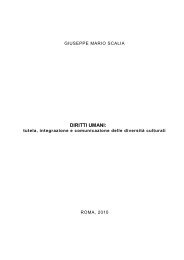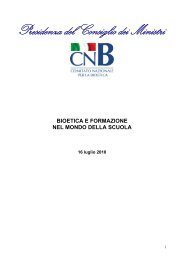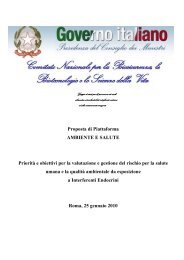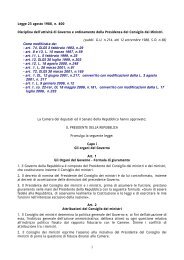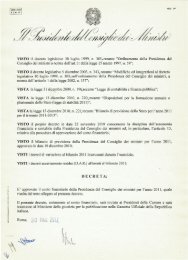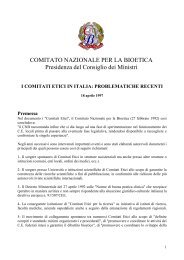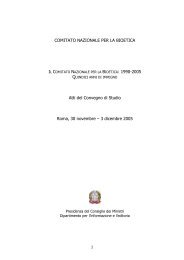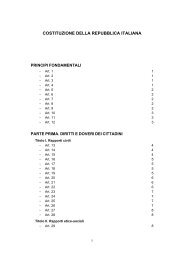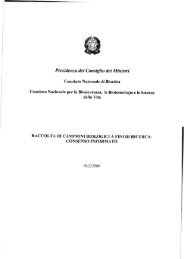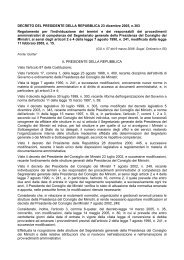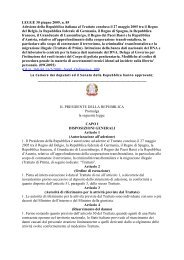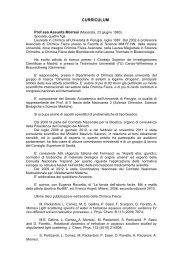President
President
President
Create successful ePaper yourself
Turn your PDF publications into a flip-book with our unique Google optimized e-Paper software.
doping is not a suppression of individual autonomy. In fact, each participant to<br />
sport freely accepts to respect the rule prohibiting doping in order to safeguard the<br />
participants’ health. Being freely accepted, the rule does not violate the principle of<br />
autonomy: no-one is forced to take part in an activity the rules of which they do not<br />
intend to accept. Additionally, we must observe that doping produces effects that<br />
limit the individual autonomy of those using it: it is typical that those who resort to<br />
doping and are discovered do not justify themselves by appealing to their selfdetermination,<br />
but to the direct and indirect pressures exercised on them by the<br />
environment, which are therefore a limitation on their real possibility of choice.<br />
It can however be observed that it is certainly possible to express a negative<br />
moral judgement, or at least of “foolishness”, towards those who knowingly risk<br />
their own health for immediate benefits: however, not always the disvalue linked to<br />
a certain behaviour is sufficient reason for a prohibition. There are many known<br />
examples of morally deplorable behaviours or that put health or life at risk<br />
(smoking, “extreme sports”, etc.), which nevertheless are not legally prohibited:<br />
instead, society accepts the additional costs and it does not discriminate against<br />
foolish behaviours with regards to the access to medical care. In the case of<br />
doping, however, this consideration does not hold: the effect of limiting individual<br />
autonomy and the harm to health does not affect only those who resort to doping.<br />
In fact, even worse is the suppression of the other athletes’ self-determination,<br />
which involves the principle of harm to others as the reason why society limits the<br />
exercise of individual self-determination 164 . There is no doubt that the recourse to<br />
doping causes harm to those who would prefer not to use it, but is defrauded of<br />
the right to a fair competition, and could be induced to doping to avoid finding<br />
him/herself in a situation of inferiority in competing for victory; and also harm to<br />
society, not so much – as we have said – for the additional healthcare costs, but<br />
also and mostly because society invests a lot in the promotion of sport and the<br />
essence of one of the social activities most appreciated for its social and moral<br />
values would be falsified, or at least weakened.<br />
Sport is a social experience and as such requires rules founded on a certain<br />
notion of this social experience. The generally shared idea that doping should be<br />
forbidden presumes that the aim of sport is not exclusively victory but that such<br />
result must be measured through the means used by the athletes in competition.<br />
After all, a good competition, a good athletic act, sporting behaviour, fair play are<br />
assessments of the athletes’ behaviour and of the competition, beyond the simple<br />
result. So, it is not about imposing a rule from the outside, according to which the<br />
athlete cannot achieve victory by using any means, but it is sportsmanship itself to<br />
require that he/she makes an effort to achieve it within certain rules that are not<br />
extrinsic, but that express the essence of sport. It’s no coincidence, after all, that<br />
we use the expression “sporting discipline” to refer to a certain sporting activity and<br />
its rules.<br />
On the other hand, being a physical activity, the principle of the respect of<br />
human dignity translates here first of all as respect for our own and other people’s<br />
body, whilst doping, which sacrifices even the health of the people who resort to it,<br />
reduces the body simply to a means to an end. Financial and social pressures<br />
164 Cf. M. Balistreri, Questioni etiche riguardanti l’uso di sostanze dopanti nello sport, in Various<br />
authors, Sport e doping. Riflessioni, edited by M. Vincenti, Priuli & Verlucca, Ivrea, 2009.<br />
120



